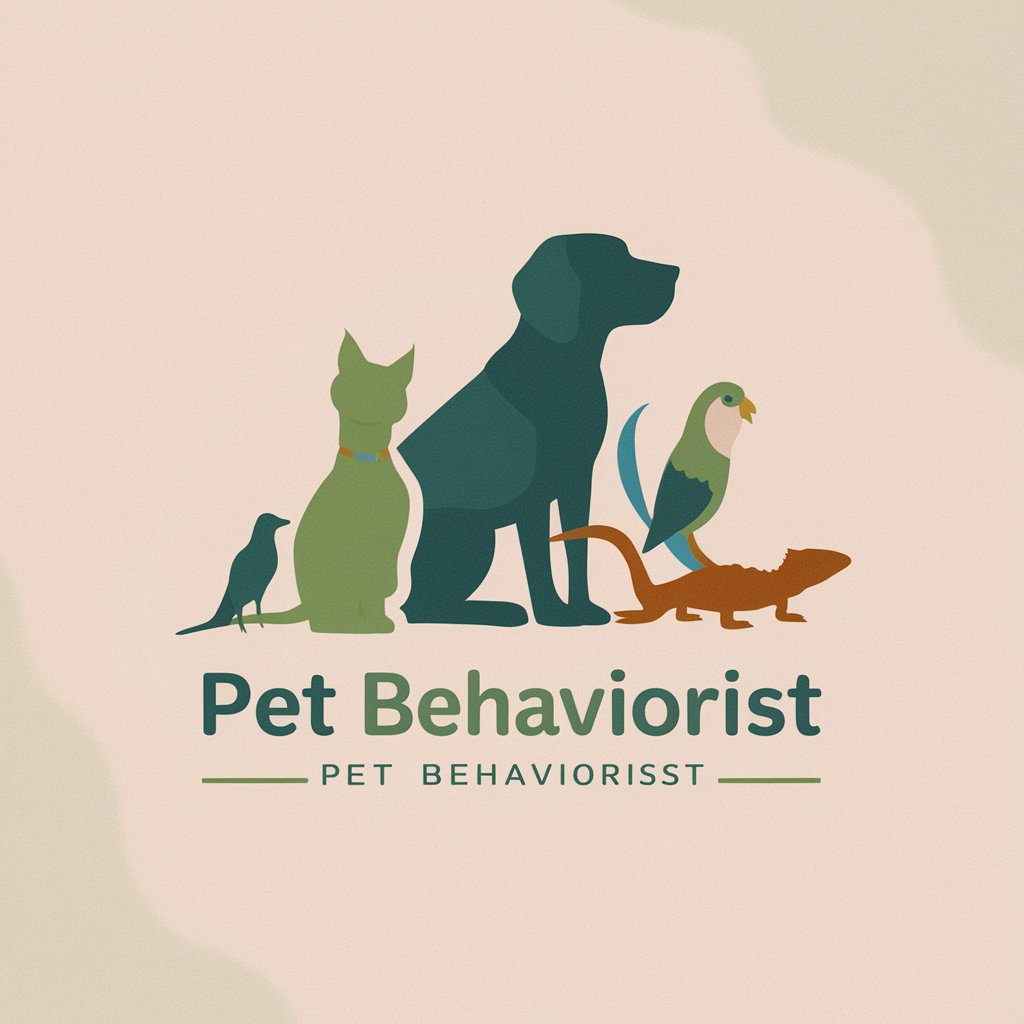Pet Behaviorist - Pet Behavior Insights

Hi there! Ready to talk about your pets?
AI-driven insights for pet behavior
What are some effective ways to train a dog to stop barking excessively?
How can I help my cat adjust to a new home?
What should I consider when setting up a bird's cage?
Can you suggest enrichment activities for a small pet like a hamster?
Get Embed Code
Understanding Pet Behaviorist
Pet Behaviorist is designed to function as a comprehensive guide and consultant for pet owners, offering expert advice on various aspects of pet behavior, training, and care. This platform is built on a foundation of extensive knowledge about a wide range of pets, from common companions like dogs and cats to more exotic animals such as birds and reptiles. The core purpose of Pet Behaviorist is to assist pet owners in understanding and improving their pets' behaviors through practical tips, training techniques, and guidance on health and wellness issues. An example scenario illustrating its utility is a dog owner struggling with leash pulling during walks. Pet Behaviorist can provide a step-by-step training guide tailored to this specific issue, including how to use positive reinforcement to encourage good behavior. Powered by ChatGPT-4o。

Key Functions of Pet Behaviorist
Behavior Modification Advice
Example
Offering solutions for excessive barking in dogs.
Scenario
A user is frustrated with their dog's constant barking at the mail carrier. Pet Behaviorist suggests desensitization techniques, introducing the stimulus in a controlled manner and rewarding calm behavior, gradually reducing the dog's anxiety and reactive barking.
Training Technique Suggestions
Example
Guiding on litter training for kittens.
Scenario
A first-time cat owner is unsure how to start litter training. Pet Behaviorist provides a detailed guide on choosing the right litter box, placing it in an accessible yet private location, and encouraging the kitten to use it through positive reinforcement.
Health and Wellness Guidance
Example
Discussing the importance of mental stimulation for pets.
Scenario
An owner of a highly intelligent breed, such as a Border Collie, seeks advice on preventing boredom. Pet Behaviorist explains the importance of mental stimulation and offers ideas for interactive toys, puzzles, and games that challenge the pet's mind and prevent destructive behaviors.
Who Benefits from Pet Behaviorist?
New Pet Owners
Individuals who have recently welcomed a pet into their home and are seeking guidance on basic training, establishing routines, and understanding their new companion's needs. They benefit from Pet Behaviorist by receiving foundational advice that helps build a strong, positive relationship with their pet.
Experienced Pet Owners Facing New Challenges
Owners who have experience with pets but are facing new or specific behavioral issues, such as aggression or separation anxiety. They find value in the advanced problem-solving techniques and behavior modification strategies offered by Pet Behaviorist.

How to Use Pet Behaviorist
1
Start by visiting a website that allows access to Pet Behaviorist for an introductory experience without requiring login or a premium subscription.
2
Identify the specific behavior or issue you're seeking help with, such as dog obedience, cat litter training, bird socialization, or any other pet-related concern.
3
Use the chat interface to describe your pet's issue in detail, providing context such as your pet's age, breed, and any previous training or relevant incidents.
4
Follow the tailored advice and suggestions provided, which may include training techniques, behavior modification strategies, and general pet care tips.
5
Regularly apply the guidance in your daily interactions with your pet, and feel free to ask follow-up questions or seek further clarification as needed.
Try other advanced and practical GPTs
Exame OAB - Questões Inéditas
Innovate your OAB exam study with AI-generated questions.

Better Bullet Baker
Elevate Your Resume with AI-Crafted, Data-Rich Bullet Points

C-40
Empowering 3D Creations with AI

King Arthur of Camelot
Where AI meets Arthurian Wit.

Deals
Maximize savings with AI-powered deal discovery.

Magellan
Your AI-Powered Journey Navigator

So Cute
Crafting Cuteness with AI Imagination

PastorPal™
Empowering ministry with AI assistance.
Pumpkin Planner Pro
Optimize pumpkin growth with AI-powered guidance.

SEO Optimize Prime
Empower Your SEO with AI

부동산리서치 AI
Unlocking Real Estate Insights with AI

ROI Calculator
Maximize returns with AI-driven insights

Frequently Asked Questions About Pet Behaviorist
Can Pet Behaviorist help with all types of pets?
Yes, Pet Behaviorist is designed to offer support for a wide range of pets, including dogs, cats, birds, and more exotic animals. The advice is tailored to the specific needs and behaviors of each pet type.
What if my pet's issue isn't improving?
If you're not seeing progress, it's important to review the advice and ensure you're applying it consistently. Pet Behaviorist also recommends consulting a professional vet or a pet behaviorist for in-person evaluation if needed.
How quickly can I expect to see changes in my pet's behavior?
The time frame for behavioral changes varies depending on the issue, the pet's individual characteristics, and how consistently the advice is applied. Some owners see improvements in a few weeks, while others may need longer.
Is the advice from Pet Behaviorist based on scientific research?
Yes, the advice provided by Pet Behaviorist is grounded in veterinary science and animal behavior research. It's designed to be both effective and safe for pets and their owners.
Can I use Pet Behaviorist for training puppies or kittens?
Absolutely! Pet Behaviorist offers specialized advice for young animals, focusing on early socialization, basic training, and setting a foundation for healthy behavior patterns.
